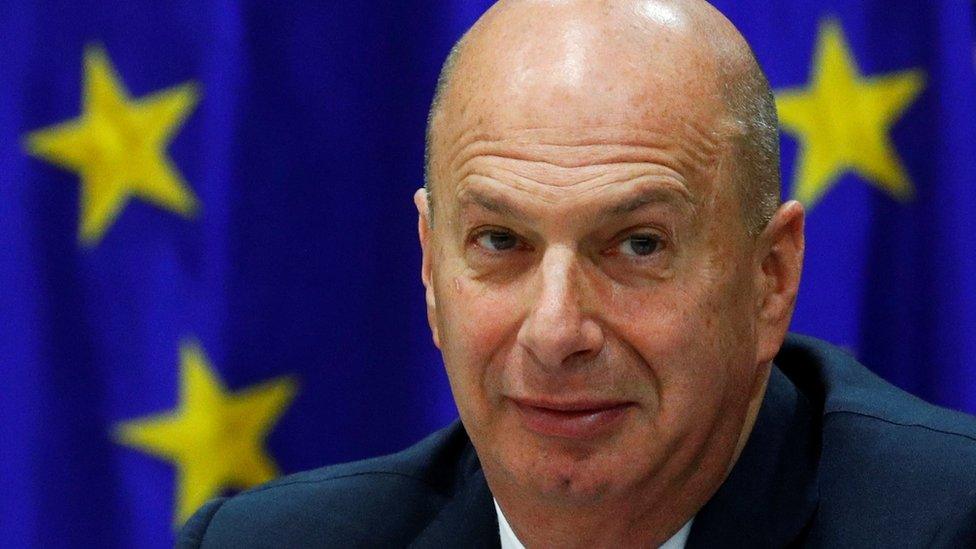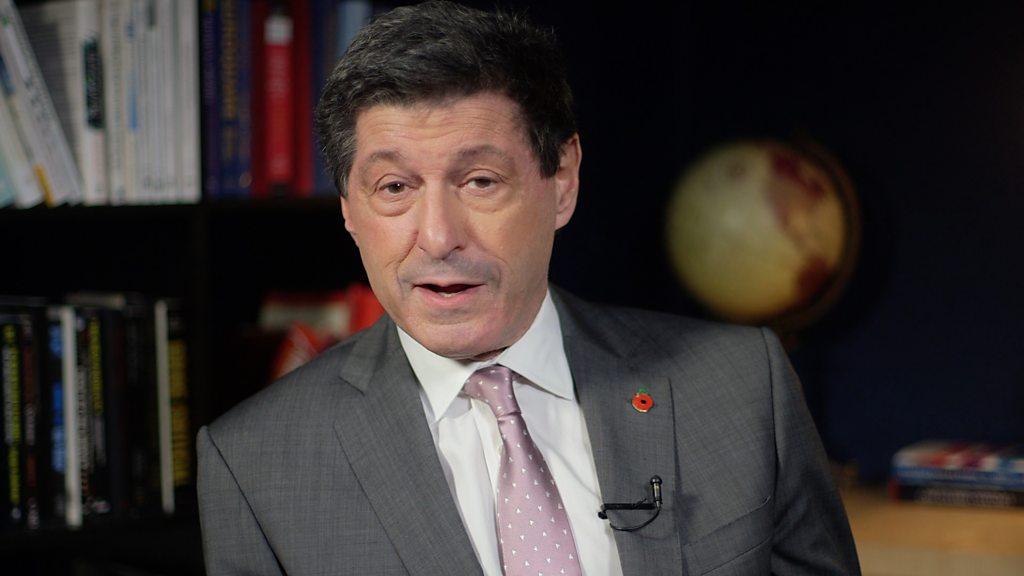Trump envoy Gordon Sondland revises testimony on Ukraine aid
- Published

A US diplomat has revised his testimony to a congressional investigation that could seek to remove US President Donald Trump from office.
Gordon Sondland says he now remembers telling a Ukrainian official that US military aid "likely" hinged on a political inquiry sought by Mr Trump.
The US envoy previously denied any politically motivated aid freeze.
Mr Trump denies withholding $400m in aid to prod Ukraine into investigating his political rival, Joe Biden.
On Tuesday, congressional impeachment investigators released a transcript of Mr Sondland's closed-door testimony last month, external.
Mr Sondland, a Seattle hotelier and Trump donor who was appointed as ambassador to the EU in June last year, filed a three-page addition to the testimony.
The impeachment inquiry is trying to establish whether Mr Trump was prodding Ukraine's president into launching an inquiry into Democratic White House contender Joe Biden, whose son, Hunter Biden, was on the board of the Ukrainian energy company Burisma.
What does the new document say?
In the addendum, Mr Sondland says he now remembers a conversation on 1 September with Andriy Yermak, an aide to the Ukrainian president.
"I now recall speaking individually with Mr Yermak, where I said resumption of US aid would likely not occur until Ukraine provided the public anti-corruption statement that we had been discussing for many weeks," Mr Sondland said.
This refers to demands that Burisma should be investigated. Mr Sondland's revision is significant because the inquiry has already heard how he emphatically denied any suggestion of a link between US aid and political investigations.
William Taylor, the acting US ambassador to Ukraine, had repeatedly questioned Mr Sondland in text messages about a quid pro quo, a Latin phrase meaning an exchange of favours.
"Are we now saying that security assistance and WH [White House] meeting [for Ukraine's president] are conditioned on investigations?" Mr Taylor had asked.
Mr Sondland had responded by text on 9 September: "Bill, I believe you are incorrect about President Trump's intentions. The president has been crystal clear no quid pro quo's of any kind."
The White House responded by noting that in his addendum, Mr Sondland "did not identify a solid source" for his assumption that there had been a quid pro quo.
"No amount of salacious media-biased headlines… change the fact that the President has done nothing wrong," White House Press Secretary Stephanie Grisham said in a statement.


Multiple sworn statements from government officials appear to have sharpened Gordon Sondland's memory.
During his 10-hour deposition last month, the US ambassador to the EU repeatedly hedged when questioned about his contacts with Ukrainian officials. Now, he can recall key details about a 1 September meeting during which he told them resumption of US military aid was conditioned on Ukraine publicly announcing an investigation that could be used to damage Joe Biden.
In other words, it was a quid pro quo.
Mr Sondland said he was doing this at the behest of Donald Trump's personal lawyer, Rudy Giuliani, who he says was making increasingly "insidious" requests of the Ukrainians. And it was the president himself who instructed Mr Sondland, and everyone else involved, to work with Mr Giuliani on Ukrainian matters.
The president and his defenders have repeatedly dismissed those objecting to his Ukrainian efforts as "never Trumpers" with political or ideological axes to grind.
Mr Sondland does not fit that label. A long-time Republican activist, he was a political appointee who had cast his lot in with the president. That makes this testimonial about-face, which puts him in synch with multiple other congressional witnesses, particularly explosive.

Also on Tuesday, Congress released the transcript of the testimony last month of Kurt Volker, external, the ex-US envoy for Ukraine negotiations.
His testimony focused on Mr Giuliani, who he said was amplifying "a negative narrative about Ukraine".
He also described Mr Giuliani's approach as a "problem" and said "it was impeding our ability" to conduct formal diplomacy.
- Published5 November 2019
